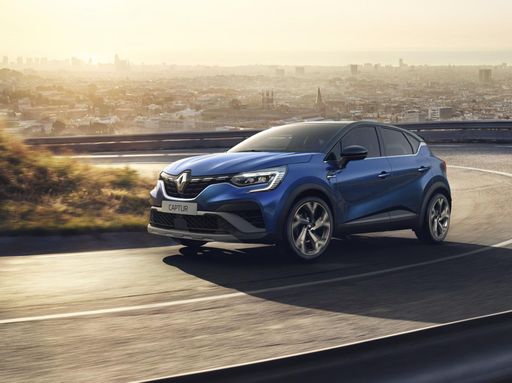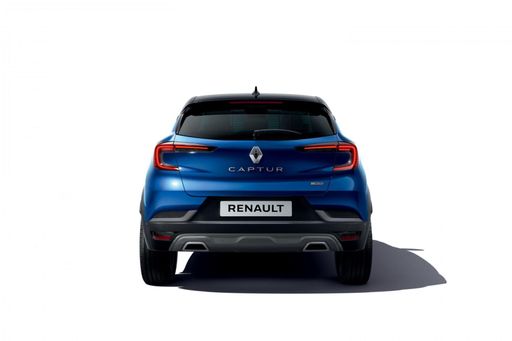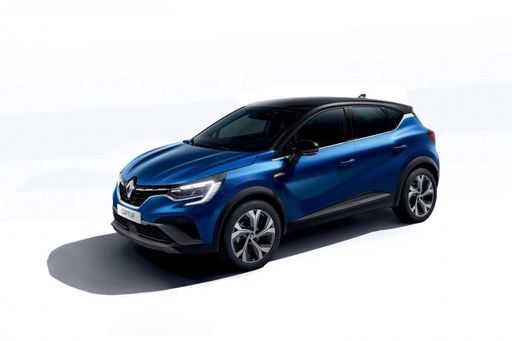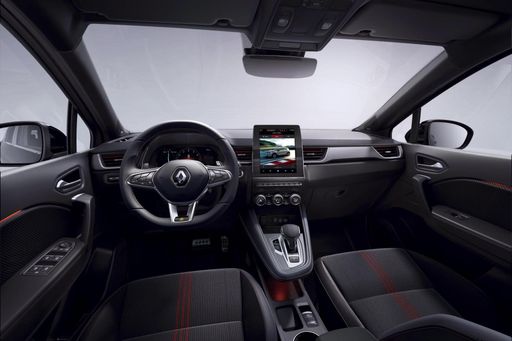Renault Captur VS Citroen Jumper – Specs, Efficiency & Price Comparison
Which model is the better choice – the Renault Captur or the Citroen Jumper? We compare performance (158 HP vs 279 HP), boot capacity (422 L vs ), efficiency (4.50 L vs 26.20 kWh7.50 L), and of course, the price (20400 £ vs 34200 £).
Find out now which car fits your needs better!
The Renault Captur (SUV) is powered by a Petrol MHEV, LPG, Petrol or Full Hybrid engine and comes with a Manuel or Automatic transmission. In comparison, the Citroen Jumper (Cargo Van) features a Electric or Diesel engine and a Automatic or Manuel gearbox.
When it comes to boot capacity, the Renault Captur offers 422 L, while the Citroen Jumper provides – depending on what matters most to you. If you’re looking for more power, you’ll need to decide whether the 158 HP of the Renault Captur or the 279 HP of the Citroen Jumper suits your needs better.
There are also differences in efficiency: 4.50 L vs 26.20 kWh7.50 L. In terms of price, the Renault Captur starts at 20400 £, while the Citroen Jumper is available from 34200 £.
Compare all the key specs now and find out which model fits your lifestyle best!
Renault Captur
The Renault Captur is a compact SUV that combines stylish design with practical functionality, making it a popular choice for urban drivers. Its interior offers a versatile and comfortable space, featuring high-quality materials and modern technology. On the road, the Captur delivers a smooth and efficient driving experience, perfect for both city commutes and weekend adventures.
details @ renault-presse.de
@ renault-presse.de
 @ renault-presse.de
@ renault-presse.de
 @ renault-presse.de
@ renault-presse.de
 @ renault-presse.de
@ renault-presse.de
Citroen Jumper
The Citroen Jumper impresses with its robust design and exceptional versatility, making it a popular choice for both business and leisure purposes. Its spacious interior is thoughtfully designed to maximise comfort and practicality, providing ample room for passengers and cargo alike. With a smooth driving experience and a range of advanced safety features, the Jumper is well-equipped to handle the demands of modern motoring.
details

|
|
|
|
|
Costs and Consumption |
|
|---|---|
|
Price
20400 - 28300 £
|
Price
34200 - 57800 £
|
|
Consumption L/100km
4.5 - 7.8 L
|
Consumption L/100km
7.5 - 9 L
|
|
Consumption kWh/100km
-
|
Consumption kWh/100km
26.20 kWh
|
|
Electric Range
-
|
Electric Range
424 km
|
|
Battery Capacity
-
|
Battery Capacity
97.80 kWh
|
|
co2
102 - 139 g/km
|
co2
0 - 233 g/km
|
|
Fuel tank capacity
40 - 48 L
|
Fuel tank capacity
90 L
|
Dimensions and Body |
|
|---|---|
|
Body Type
SUV
|
Body Type
Cargo Van
|
|
Seats
5
|
Seats
3
|
|
Doors
5
|
Doors
4
|
|
Curb weight
1293 - 1514 kg
|
Curb weight
2075 - 2940 kg
|
|
Trunk capacity
326 - 422 L
|
Trunk capacity
-
|
|
Length
4239 mm
|
Length
5413 - 6363 mm
|
|
Width
1797 mm
|
Width
2050 mm
|
|
Height
1575 mm
|
Height
2254 - 2850 mm
|
|
Payload
375 - 457 kg
|
Payload
560 - 2020 kg
|
Engine and Performance |
|
|---|---|
|
Engine Type
Petrol MHEV, LPG, Petrol, Full Hybrid
|
Engine Type
Electric, Diesel
|
|
Transmission
Manuel, Automatic
|
Transmission
Automatic, Manuel
|
|
Transmission Detail
Schaltgetriebe, Automat. Schaltgetriebe (Doppelkupplung), Automatic Gearbox
|
Transmission Detail
Schaltgetriebe, Automatikgetriebe
|
|
Drive Type
Front-Wheel Drive
|
Drive Type
Front-Wheel Drive
|
|
Power HP
91 - 158 HP
|
Power HP
120 - 279 HP
|
|
Acceleration 0-100km/h
8.5 - 14.3 s
|
Acceleration 0-100km/h
-
|
|
Max Speed
168 - 180 km/h
|
Max Speed
90 - 170 km/h
|
|
Torque
160 - 270 Nm
|
Torque
320 - 450 Nm
|
|
Number of Cylinders
3 - 4
|
Number of Cylinders
4
|
|
Power kW
67 - 116 kW
|
Power kW
88 - 205 kW
|
|
Engine capacity
999 - 1789 cm3
|
Engine capacity
2184 cm3
|
General |
|
|---|---|
|
Model Year
2024 - 2025
|
Model Year
2024
|
|
CO2 Efficiency Class
D, C
|
CO2 Efficiency Class
A, G
|
|
Brand
Renault
|
Brand
Citroen
|
Renault Captur
The Renault Captur: A Modern Fusion of Style and Efficiency
The Renault Captur has carved a unique niche for itself in the compact SUV segment, combining eye-catching design with advanced technology. As we delve into its technical specifications and innovative features, it's clear why this model continues to captivate automotive enthusiasts and everyday drivers alike.
Under the Bonnet: Power and Performance
The Renault Captur offers a diverse range of powertrains, catering to different driving preferences and needs. Whether you opt for a full hybrid or a mild-hybrid petrol engine, the Captur provides an impressive blend of power and efficiency. The power output ranges from 91 to 158 PS, ensuring a versatile drive whether you're navigating urban streets or hitting the open road.
With a fuel consumption range of 4.7 to 7.8 L/100km, Renault has engineered the Captur with an environmental focus, presenting one of the more economical offerings in its class. The CO2 emissions range from 106 to 139 g/km, adhering to modern demands for reduced environmental impact without compromising on performance.
Technological Innovation: E-Tech Hybrid System
An exciting feature of the Captur is its E-Tech hybrid system, a testament to Renault's commitment to innovation. This system intelligently combines a petrol engine with an electric motor to optimise energy usage, offering both power and efficiency seamlessly. This technology is particularly beneficial in urban settings where frequent stopping and starting can traditionally increase fuel consumption and emissions.
Driving Dynamics and Comfort
The Renault Captur is built with front-wheel drive and offers both manual and automatic transmission options, including cutting-edge dual-clutch systems for smooth gear changes. Offering a maximum torque of 160 to 270 Nm ensures a responsive drive across various terrains. Coupled with its agile handling and a maximum speed range of 168 to 180 km/h, the Captur is as adept on a motorway as it is in city environments.
Comfort has not been overlooked; with five seats and spacious dimensions of 4239 mm in length, 1797 mm in width, and 1575 mm in height, the Captur provides ample space for passengers and luggage alike. The boot space ranges from 326 to 422 litres, accommodating anything from daily grocery shopping to holiday luggage with ease.
Manufacturing Excellence: Safety and Quality Features
Safety and quality are core components of the Captur's design. It features advanced safety technologies and driver-assistance systems, ensuring peace of mind on every journey. The model's CO2 efficiency classes range between C and D, aligning with current environmental standards while still prioritising driver and passenger safety.
Conclusion: A Compelling Choice in Its Class
With a price range between €22,950 to €32,750, the Renault Captur represents a compelling balance of affordability and feature-rich ownership. For those seeking a vehicle that harmonises cutting-edge technology, ecological mindfulness, and dynamic driving experiences, the Captur stands out as a particularly attractive choice in the competitive SUV market.
In summary, the Renault Captur's combination of modern styling, advanced hybrid technology, and practical features places it firmly as a leading contender for anyone considering a contemporary SUV purchase.
Citroen Jumper
A Game-Changer in the Electric Van Market: The Citroën Jumper
The Citroën Jumper stands out in the realm of electric vans, bringing a blend of innovation, efficiency, and versatility to the table. This vehicle is designed to meet the needs of businesses searching for sustainable transport solutions, while also delivering impressive performance and technology.
Power Meets Performance: Technical Specifications
The Citroën Jumper is powered by an electric motor that provides an impressive 270 PS (200 kW) output. It operates with front-wheel drive and utilises an automatic transmission for smooth and efficient power delivery. The vehicle boasts a maximum torque of 410 Nm, ensuring it can handle various loads with ease.
A critical factor for business owners is operational cost, and the Jumper excels with a consumption rate of 26.2 kWh/100km and a driving range of 424 km on a full charge. This efficiency is complemented by a zero-emissions output, earning it a CO2 efficiency class of A.
Innovative Design and Features
Citroën has ingeniously optimised the Jumper's design for practicality and comfort. With a body style classified as a transporter, the vehicle is crafted for utility without sacrificing on essentials. It features a standard four-door configuration and offers seating for three, making it a practical choice for various industries.
The versatility in design is reflected in its various configurations, capable of accommodating different load requirements with a payload capacity ranging from 560 to 1385 kg. The Jumper's dimensions vary slightly with model choice, with lengths between 5998 mm and 6363 mm, width at 2050 mm, and height ranging from 2612 mm to 2850 mm.
Electric Innovation at its Core
At the core of the Citroën Jumper is its robust 97.8 kWh battery, making long journeys more feasible in the realm of electric vehicles. Notably, the vehicle maintains a lighter carbon footprint, contributing to sustainable transport solutions with its zero CO2 emissions.
Another innovation is the vehicle's capacity to reach top speeds between 90 km/h to 130 km/h, which shows that electric vans can maintain competitive performance metrics.
A Worthy Investment
While the Citroën Jumper signifies a higher initial investment, with prices ranging from €65,212 to €68,425, it promises considerable savings in fuel costs and environmental benefits over time. It presents an attractive proposition for businesses keen on contributing positively to the planet while maintaining operational efficiency.
In summary, the Citroën Jumper is a perfect embodiment of how electric vehicle technology can adapt to commercial needs, offering an efficient, innovative, and environmentally friendly transport solution.
The prices and data displayed are estimates based on German list prices and may vary by country. This information is not legally binding.
